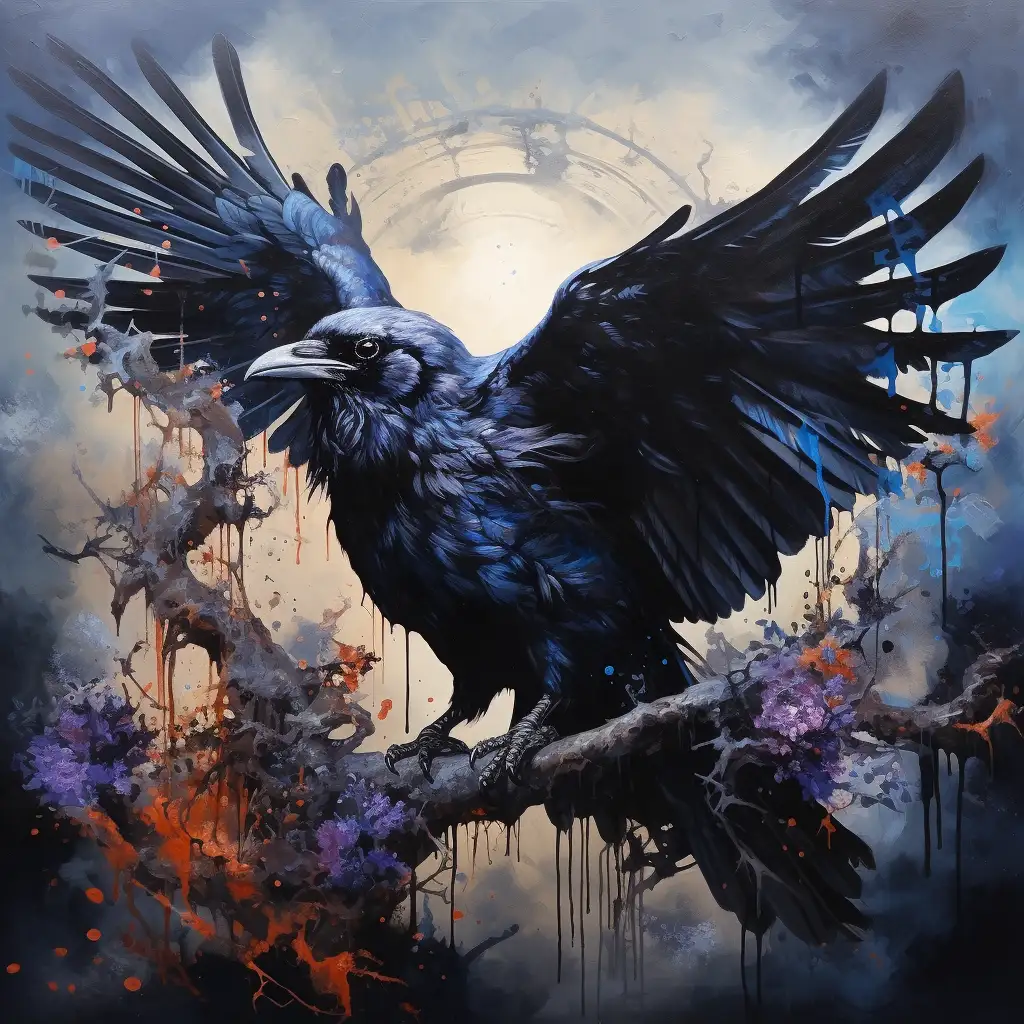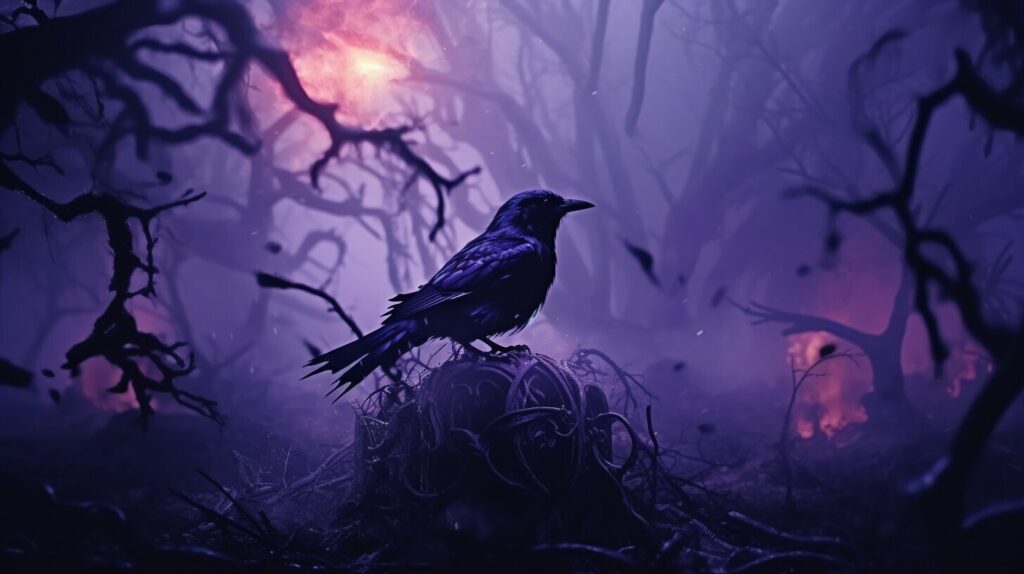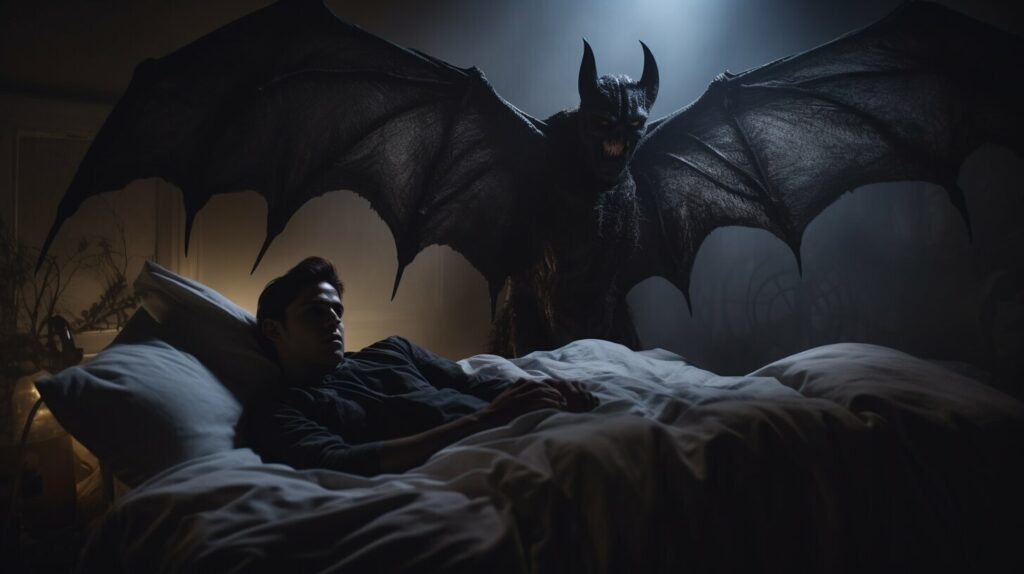Dreams featuring ravens can symbolize various aspects such as transformation, wisdom, and the unknown, drawing from cultural and mythological associations of ravens with mysticism and prophecy. These birds often appear as messengers in dreams, potentially indicating the dreamer’s deep subconscious insights or changes looming on the horizon. The context and emotions experienced in the dream are crucial for interpretation—while some may find ravens ominous or foreboding, reflecting fears or anxieties, others might see them as guides towards self-awareness or a call to explore the shadowy depths of their psyche for growth and understanding. Reflecting on personal and cultural perceptions of ravens can provide further insight into the dream’s meaning.
Let’s now discuss this dream in greater detail…
Have you ever had a dream about ravens? These mysterious, black birds have long been associated with magic and prophecy in various cultures. As such, dreams about ravens can carry significant meaning and symbolism for the dreamer. Understanding what dreams about ravens mean can offer insights into your subconscious mind and help you navigate your waking life with greater awareness. In this article, we’ll explore the symbolism of dreaming about ravens, provide guidance on how to decode raven dream symbols, and discuss the potential benefits of understanding these dreams.
Symbolism of Dreaming About Ravens
Dreams about ravens have a rich symbolic significance that can reveal profound truths about the dreamer’s inner world. In various cultures and mythologies, the raven is often associated with magic, transformation, and wisdom. As such, this feathered creature is viewed as a powerful messenger that can convey important messages from the spirit world.
One of the most common spiritual meanings associated with dreaming about ravens is that of transformation. The raven is often seen as a symbol of metamorphosis and positive change. Similarly, dreaming about ravens can also be interpreted as a sign of awakening, particularly in regards to spiritual or personal growth.
In some cultures, the raven is also associated with magic and shamanic practices. It is believed that the raven can help to unveil hidden truths and guide the dreamer through difficult challenges. As such, dreaming about ravens can be interpreted as a call to embrace one’s own innate power and tap into the wisdom of the intuitive mind.
Symbolism of Dreaming About Ravens in Norse Mythology
In Norse mythology, the raven is associated with the god Odin, who is often depicted with two ravens on his shoulders. These birds, named Huginn and Muninn, are said to represent Odin’s ability to gain knowledge from the spiritual realms. Dreaming about ravens in Norse mythology can thus signify the pursuit of wisdom and knowledge, as well as the importance of seeking guidance from higher powers.
Decoding Raven Dream Symbols
When it comes to interpreting dreams about ravens, analyzing specific symbols and imagery can provide valuable insights into the dreamer’s subconscious mind. Here are some common raven dream symbols to look out for:
| Symbol | Meaning |
|---|---|
| Black color | Represents mystery, the unknown, or death. It can also signify a need for transformation or change. |
| White color | Symbolizes purity, clarity, and a search for truth. It can also signify a need for cleansing or purification. |
| Flying | Represents freedom, elevated perspective, or a desire to escape from a situation. It can also signify a need for independence. |
| Croaking | May indicate a warning or a message from the subconscious mind. It can also represent a need for communication or expression. |
| Interacting with the dreamer | May signify a need for connection, protection, or guidance. It can also indicate an aspect of the dreamer’s own personality or inner voice. |
It’s important to consider the context in which these symbols appear in the dream. For example, a black raven may have a different meaning if it is perched on a gravestone versus if it is flying in a blue sky. Similarly, the emotions and feelings experienced during the dream can add further clues for interpreting the symbols.

Common themes in Raven Dreams
Recurring themes in dreams about ravens can also hold significant meaning. Here are some examples:
- Communication: The raven may be trying to convey a message or facilitate communication between the dreamer and another person or entity.
- Transformation: The raven may signify a need for change or a desire for personal growth and transformation.
- Protection: The raven may be serving as a protector, warning the dreamer of potential danger or harm.
- Death or rebirth: The raven can represent the cycle of death and rebirth, indicating a need for closure or a new beginning.
By identifying and interpreting these common themes, dreamers can gain a deeper understanding of the underlying messages in their raven dreams.
The Significance of Raven Dreams
Recurring dreams about ravens or vivid raven dreams can hold significant meaning for the dreamer. They may serve as a call to pay attention to certain aspects of one’s life or hold hidden messages. Understanding the significance of raven dreams can lead to personal growth and self-awareness.
Ravens in dreams can represent elements of the dreamer’s psyche that are being repressed or ignored. They can also indicate a need to embrace the darker aspects of oneself, such as fears or desires that have been suppressed. By acknowledging and addressing these aspects, the dreamer can move towards a sense of wholeness and balance.
Cultural Interpretations of Raven Dreams
The symbolism of ravens in dreams has been interpreted differently across various cultures and belief systems. In Norse mythology, ravens are associated with the god Odin, who had two ravens named Huginn and Muninn that would fly around the world and bring him information. Similarly, in Celtic mythology, ravens are believed to be messengers that can communicate with otherworldly beings.
In Native American cultures, the raven is seen as a trickster figure that symbolizes transformation and change. It is known for its intelligence and ability to adapt to different environments, making it a symbol of survival. In some cultures, the raven is also associated with death and the afterlife, as it is believed to guide the souls of the deceased to the spirit realm.
The significance of dreaming about ravens can also vary depending on the context in which the bird appears. For example, in some Asian cultures, a single raven is seen as a good omen, while a group of ravens is considered a bad sign. In European folklore, seeing a raven on one’s wedding day is believed to bring good luck, while hearing a raven’s call during a journey is considered an ominous warning.
Greek Mythology
In Greek mythology, ravens are associated with the god Apollo, who took the form of a raven to deliver a message that helped the city of Troy win a battle. Ravens were also believed to be messengers of the god of prophecy, Apollo’s son, Asclepius.
In interpreting dreams about ravens, it can be helpful to consider the cultural symbolism associated with the bird as well as the personal context in which the dream occurs.
Common Themes in Raven Dreams
While dream symbolism is highly personal, some common themes often emerge in dreams featuring ravens. Understanding these themes and their possible meanings can help decode the messages our subconscious is trying to convey.
One common theme in raven dreams is communication. Often, the raven in the dream is seen either speaking directly to the dreamer or carrying a message of some sort. This can represent the dreamer’s desire for clearer communication in their waking life or an indication that important information is being conveyed to them in subtle ways.
Another theme in raven dreams is protection. Ravens are known for their loyalty and protective nature, and seeing one in a dream may indicate a need for protection or support. Alternatively, it may represent the dreamer’s desire to be more protective of themselves or someone else in their life.
A third common theme in raven dreams is warning. Ravens are often associated with death and the underworld, and seeing one in a dream may indicate an impending danger or warning of some sort. Alternatively, it may represent the dreamer’s fear of something happening or a need to be more cautious in their waking life.
Example of Common Themes in Raven Dreams
| Dream Scenario | Interpretation |
|---|---|
| A raven perched on a windowsill | The dreamer may be receiving a message or warning from the spiritual realm, possibly related to their home or daily life. |
| A raven leading the dreamer to a hidden path | The dreamer may be seeking guidance or a new direction in their life, and the raven represents a guide or mentor figure. |
| A flock of ravens attacking the dreamer | The dreamer may be feeling overwhelmed or threatened in their waking life, possibly by a group of people or a specific situation. |
These common themes can provide a starting point for interpreting raven dreams, but it’s important to remember that each dream is unique and should be evaluated in the context of the individual dreamer’s life experiences and emotions.

Interpreting Negative or Positive Raven Dreams
The emotional tone of a dream can be integral to understanding its message. Whether a raven dream is positive or negative can provide insight into the nature of its symbolism and the subconscious mind of the dreamer.
Negative Raven Dreams: These dreams can be frightening or unsettling, but they often carry an important message. A raven in distress or behaving aggressively may indicate impending danger or a warning of some kind. Alternatively, negative raven dreams may reflect feelings of fear, anxiety, or uncertainty about a situation in the dreamer’s waking life. Paying attention to the emotions felt during the dream can provide clues to the source of this unease.
Positive Raven Dreams: These dreams can be uplifting and empowering, often indicating opportunities for personal growth or transformation. A raven appearing as a guide or companion may symbolize wisdom or intuition, leading the dreamer towards a positive outcome. Positive raven dreams may also reflect feelings of courage, strength, or determination in the dreamer’s waking life.
Interpreting negative or positive raven dreams requires careful attention to the context and emotional tone of the dream. Emotions and emotions can be powerful indicators of the subconscious mind and can provide valuable insights into the dreamer’s waking life.
Other Bird Symbols in Dreams
While ravens are a common bird symbol in dreams, other avian creatures can also offer valuable insights into the dreamer’s psyche. Crows, for example, are often associated with intelligence, adaptability, and transformation. In dreams, they may represent change, personal growth, or the need to adapt to new situations.
Owls, on the other hand, are often seen as symbols of wisdom, intuition, and mystery. In dreams, they may suggest the need to listen to one’s inner voice, seek knowledge, or trust one’s instincts. Eagles, with their soaring flight and sharp vision, symbolize freedom, power, and victory. In dreams, they may represent ambition, success, and the ability to overcome obstacles.
When analyzing bird symbols in dreams, it’s important to consider not just the specific species, but also their behavior, appearance, and context within the dream. The interaction between different bird symbols can also provide clues about the dream’s message and the dreamer’s emotional state.
Techniques for Remembering and Analyzing Raven Dreams
Remembering dreams can be a difficult task, but there are several techniques that can enhance dream recall and help you analyze your raven dreams more effectively. Here are some tips:
- Keep a dream journal: One of the most effective ways to improve dream recall is to write down your dreams as soon as you wake up. Keep a notebook and pen by your bed, and jot down any details you can remember about your raven dream. Even fragments of a dream can be useful later on.
- Set intentions before sleep: Before going to bed, take a few minutes to set an intention to remember your dreams. Repeat a mantra or affirmation that focuses on dream recall, such as “I will remember my dreams tonight.” This can help program your subconscious mind to prioritize dream recollection.
- Use visualization exercises: Visualization exercises can help you enhance your ability to recall and interpret dreams. Imagine yourself walking through a door and into a room filled with symbols and imagery related to your raven dream. Take note of any details that catch your attention and analyze them later on.
- Pay attention to emotions: Emotions can provide valuable clues to the meaning of your raven dream. Take note of any intense feelings or reactions you experienced during the dream, and reflect on what they might signify. Emotions can often reveal deeply ingrained beliefs or desires.
- Look for patterns: Pay attention to recurring symbols or themes in your raven dreams. Are there any similarities between different dreams? Are certain symbols or colors consistently present? Identifying patterns can help you develop a deeper understanding of the messages your subconscious is trying to convey.
By using these techniques, you can improve your ability to remember and analyze your raven dreams. Remember that dream interpretation is a highly personal process, and there is no one “right” way to approach it. Trust your instincts, stay open to new insights, and be patient as you explore the rich inner world of your subconscious mind.
Benefits of Understanding Raven Dreams
Decoding dreams about ravens and understanding their meaning can offer various benefits for the dreamer. Here are some of the advantages of interpreting raven dreams:
- Insight into personal struggles: Raven dreams can often reflect the dreamer’s subconscious desires, fears, and conflicts. By analyzing the symbols and themes in these dreams, individuals can gain a deeper understanding of their inner struggles and work towards resolving them.
- Guidance for decision-making: Raven dreams can also provide guidance for making important life decisions. By exploring the hidden messages and meanings in these dreams, individuals can gain clarity on their goals, priorities, and next steps.
- Emotional healing: Raven dreams may contain elements that are related to past traumas or emotional wounds. By interpreting the symbols and themes in these dreams, individuals can address these emotional wounds and find closure and healing.
- Increased self-awareness: Understanding the symbolism of raven dreams can help individuals gain a deeper understanding of their personality, strengths, and weaknesses. This increased self-awareness can lead to personal growth and self-improvement.
- Connection to spirituality: Raven dreams are often associated with spirituality and mystical experiences. By deciphering the symbols and themes in these dreams, individuals can connect with their spiritual beliefs and gain a deeper understanding of their spiritual path.
Overall, understanding the meaning of raven dreams can provide individuals with valuable insights into their subconscious, emotional, and spiritual worlds. By engaging in the process of interpreting these dreams, individuals can gain a deeper understanding of themselves and their place in the world.
What Do Dreams About Ravens Mean: Conclusion
Understanding the meaning behind dreams about ravens can provide valuable insights into one’s subconscious mind. Through exploring the symbolism and cultural interpretations of raven dreams, readers can gain a deeper understanding of their emotional state and desires. By analyzing specific symbols and themes, readers can decipher hidden messages and gain guidance for decision-making and personal growth.
Remembering and analyzing raven dreams can be enhanced through practical techniques, such as keeping a dream journal and setting intentions before sleep. By paying attention to recurring symbols and emotional tones, readers can gain a deeper understanding of the significance of their dreams.
Decoding dreams about ravens can offer many benefits, including emotional healing, personal insights, and guidance for decision-making. By engaging in the process of dream analysis and interpretation, readers can empower themselves and cultivate greater self-awareness.







